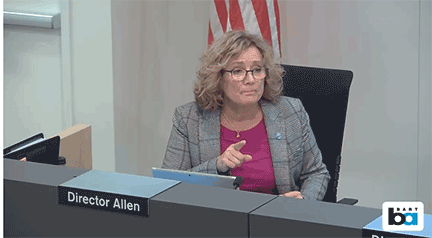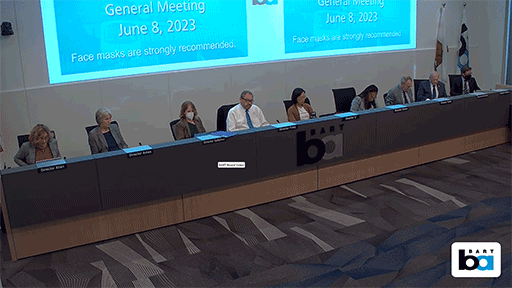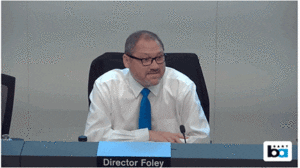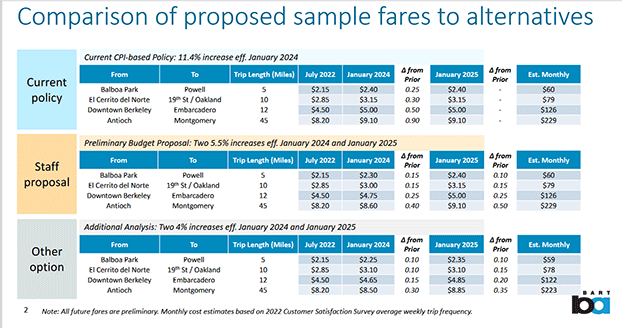Last week, the Bay Area Rapid Transit Board for the third time refused to look at spending cuts when it approved its $5.1 billion 2-year budget which includes a $93 million deficit. Over a 5-year period, the deficit jumps to nearly $1 billion.
The BART Board was asked a total of three times to consider spending cuts to help get to a balanced budget, six directors declined the offer while mocking Directors Debora Allen and Liz Ames in the process for even making substitute motions–ironically, neither could make such suggestions in previous meetings on spending cuts because staff presented the budget as “informational only”.
Here is how the Board voted in terms of even looking at spending cuts:
- June 8 – Ames motioned for a balanced budget over a 2-year period ($46,5 million x2 years) – voted down 7-2.
- June 8 – Allen motioned for a balanced budget to address $93 million deficit – voted down 6-3.
- May 11 – a straw poll taken at the meeting at the request of Allen to see what BART would look like under a 10% cut went down in a 3-6 vote. (see story)
With a 6-3 vote with Ames, Allen and McPartland dissenting, the Board approved the budget which included a 8% spending increase in operational cost at the same time it was seeking a state and federal bailout and the transit agency struggles to get riders back on trains.
Although public safety is a topic concern to ridership, the Board provided only a small increase to the police department jumping from $108 million to $110 million.
As part of last weeks meeting, the Board voted to increase fares twice over two years, by 5.5% each (11.4% total) while also increasing the Clipper START discount to 50%. It also adjusted its parking policy to allow staff to adjust parking fees.

Director Allen’s Commentary:
“I am going to summarize this the way I see it before us. You are asking us to pass this 2-year budget before us and has a $93 million structural deficit built into it. We can say well that’s FY-25, but the bottom line is it’s a 2-year budget with a $93 million deficit over two years. While knowing we have operating deficits of $300 million annually to date that have been filled by federal subsidies that are going to run out and that there will be another billion in deficits over the next 3 years after those federal subsidies run out. This is a pretty dire situation and in my opinion is a crisis. It’s a financial crisis.
I am very bothered by our plan here. And the plan is to not do any budget mitigations until the fall. Until after we pass this budget and then we find out how much additional subsidies we get from the State. We are not going to act on adjusting the budget until then. I really do thank and robust work of you all sitting here and my board colleagues for finding the additional revenue. Its certain we cannot keep BART sustainable without additional revenue.
The only question for me is how much is that. I’ve said it many times over the past you that this agency must meet halfway or at least part-way. Maybe its not half with finding efficiencies in operations, cost efficiencies as well as finding new revenues.
But, it seems like what is before us today, where we are today, is that if the state fills our deficits through Fiscal Year 2026 and we hope that the taxpayers will pass a tax measure to fill in the rest for the rest of time then we can continue spending as usual because we will have the money to fill the deficits in these budgets and we really wont be forced to act.
We seem to be saying here, which is really the perception and saying to the taxpayers give us more money now and then we will see what we can do later about addressing our spending after we have the money.
I am sorry folks, I have zero confidence that will happen. I’ve been around here for almost 7 years and I just don’t think it works that way. This is the wrong approach and it really does send a poor message to the taxpayers who fund already 100% of the capital cost of the system and currently fund 75% of our operating budget as well.
Then they are going to be asked to fund $300 million plus after the federal subsidies run out and for the rest of time.
To be clear, BART did not cause this situation that we are in. To be clear, BART did not cause the pandemic. And BART did not cause the crisis that we see on the streets of San Francisco and the work from home phenomenal and frankly a lot of the businesses packing up and leaving San Francisco. That is all impacting our ridership.
But here we are in this position of structural long-term deficits and we must act responsibly.
Our return of riders is 20 points lower than many other metropolitan areas and surveys that have been done, lots of surveys, continue to say it has to do with our cleanliness and our public safety. That is why I asked about the police budget. The answer is it’s only going up 2%.
I won’t tell you about my own train ride over here this morning except to say it was less than acceptable with respect to what I encountered.
We should be putting forth a long-term plan now of how to operate our system sustainable for the next 50-years, not these short-term patchwork things and hope for this, maybe this. That includes finding cost efficiency and how we deliver the service. It doesn’t mean business as usual.
The numbers don’t lie. We continue to increase our cost of operation the system well beyond pre-pandemic while only carrying on 40% of the ridership. That simply isn’t sustainable.
I applaud the efforts to get the additional funding but that cannot be the only plan. The two-year budget before us with a $93 million net deficit shows us spending more than we have revenue to cover at the end of the two-years. We are planning for structural deficits and that is the breach of our fiduciary duty as board members here.
For that reason, I am going to make a substitute motion that goes as follows. The first part of this motion is identical to what is already put forth from the packet. The Board adopts the proposed resolution in the matter of approving the annual budget for the Bay Area Rapid Transit district and authorizes expenditures for the Fiscal Year July 1, 2023 to June 30, 2024 and July 1, 2024 to June 30, 2025 with the following amendments:
-
- Reduce the operating expenses from $93 million from the fiscal year 2024 and reducing net deficits over the two-year period for FY 24 and FY 25 to $0. Provide a 2-year balanced budget with no deficit spending.
- Reallocate all expenditures from Link 21 for FY 24 ($48 million) to the Fare Gate Replacement project and other station hardening to help prevent fare evasion and help expedite the fare gate replacement with a goal of Dec 1, 2024 for completion.
The substitute motion received a 2nd.

BOARD Commentary:
Director Rebecca Saltzman stated they had been working on this budget for a while and budgeting on the fly doesn’t always work. She stated “this is not the time to do something like this.”
“Asking staff to just cut $93 million. It seems really irresponsible of the board because it seems like we are just giving them carte blanche to do whatever they want. They are going to go figure out what programs they don’t want to fund. Who they want to cut. Its not going to be based on Board priorities. If we really want to consider this. We should have done this months ago,” stated Saltzman. “If we really wanted to consider this, we should have done this months ago… I don’t think it makes sense. I think we have a real shot at getting significant funds from the state legislator so there is no reason to do it now.”
She said ideally, they would have a Governor like New York who would have stepped in and fixed the situation already. She said there was till time to get more funding from the state and can come back in the fall.
“Once we cut service, we begin losing riders permanently or for a very long time,” said Saltzman.
Ames Offers Second Substitute Motion
Director Liz Ames offered up a second substitute motion which she called similar to Director Allen.
- Reduce the operating budget by $46.5 million from each of the FY 24 & FY 25 budgets. Provide a balanced budget over a 2-year period with no deficit spending. (splitting $93 million over 2-years)
- Reallocate all expenditures related to Link 21 for FYI 24 & FY 25 to Fare Gate Replacement project and other station hardening to prevent fare evasion.
- Staff will complete ridership pass study by end of FYI 24
- Staff will complete a Bay Area Transit Consolidation study by end of 2024 – she wanted Board to take the lead.
Her motion was seconded.
Director McPartland responded to Saltzman saying he has gone through two budget crunches and they saved a lot of funding by not replacing positions so it wouldn’t equate to shutting down services—hiring freeze for everyone but law enforcement and train operators.
Director Lateefah Simon said there are folks who have no options and need to be on public transit every single day and said she would support the staff recommendation. She said she looked forward to October to discuss their budget and see the strategies staff brings back

Director Foley thanked staff stating they were trying to solve a puzzle that does not yet have a solution.
“I appreciate you are bringing something to us to address the short-term needs of the agency,” said Foley. “What I would like to see in October is something that addresses scaling back or pausing Link 21 which I brought up in February. I do think that is something we seriously need to look at given the state of transit and BART.”
Foley stated he supported Ames concept of an all-day multiuse pass product in the form of a pilot—he hoped to create an opportunity to grow ridership some way.
Foley asked Allen to explain her motion in which she responded she wanted a balanced budget which by Fiscal Year 2025 they come to the budget with no deficit. She said the revisions would come mid-year and in October.
President Janice Li said she was not “happy” about shifting Link 21 money and calling for cuts.
“To bring this up now is bad governance,” said Li. “The people putting together substitute motions are people who have had their ideas uniformly dismissed by this Board, including a 10% cut which is irrational budgeting in my mind given the number of fixed costs that we have or are people who have rejected the past staff budgets.”
She called changing course on their budget a week before the state legislators deadline to pass a budget is deathly stating they would lose support from people such as Senator Scott Wiener who has been their “strongest advocate” while alienating Assemblymember Phil Ting and Senator Nancy Skinner who are actively advocating for BART.
She continued by stating transit agencies were not built to be “nimble” and work to approve staff recommendations.
“Either you are working with staff and you are pushing them and understanding where things can move. Or you need to be overwhelming in building public support for your ideas,” said Li. “I am sorry, I see no one here. Furthermore, no one spoke at recent transit rallies saying these things in the substitute motions. I absolutely do not support the substitute motions.”
Director Raburn says BART has been for three years to tighten its belt and called both substitute motions “irresponsible to our riders.” He called the cuts would harm the delivery of service and they could not go there and adopting a budget at the last minute that represent ideas that haven’t been on the table for the public to weigh in on.
Allen again spoke reminding the Board that Li, Foley and herself asked about a pause on Link 21 back in February while also noting all of the discussion over the budget the past five months have all been for “information only” and there was no opportunity until today, which she said was put out in the publics sphere on May 11.
“The only opportunity to change the budget that staff put forward is right here and right now,” explained Allen. “That was made really clear. So I am exercising that option with two changes and Director Ames has added changes. I don’t understand why all the anger and the statements that are not true that we have never mentioned this before. Director Ames and I have talked about the operations.”
She said she was asking for an 8% increase to be dialed by 11%.
“The world is not going to end with that,” stated Allen. “I still wonder how we got to a 7.5% increase when the labor issues when you are reducing vacancies you are hiring more people. So how that is not part of expanding service, I am not really clear on that part. But this is not new stuff. What I have proposed are parts of a budget and you all can vote no and away we go and the budget passes.”
stamp” work by staff.
“We don’t work for staff. Its our responsibility to direct the staff. That is what this whole process is all about,” stated McPartland noting that a 10% cut maybe takes a train from 15-minutes to a 20-minute arrival time not shutting down, perhaps a hiring freeze. “We find ourselves in a position and its up to staff to come back with recommendations.”
He stated they would not pull themselves away from this fiscal cliff with just a 10% cut, but rather they needed help from the State and Federal legislators.
“I’ve said this for three straight meetings that these state and federal legislators are going to be less inclined to help us if we have not done something for ourselves, period!” stated McPartland.
Director Dufty laughed stating they did do something for themselves today.
“We approved the inflation-based-fares,” stated Dufty.
BOARD Votes
- Ames Substitute Motion: failed in a 7-2 vote Ames and Allen dissenting
- Allen Substitution Motion failed in a 6-3 vote with Ames, Allen and McPartland dissenting
- BART Staff Budget Recommendation: passed in a 6-3 vote with Ames, Allena and McPartland dissenting.

Recent BART HEADLINES
- June 9 – BART Board of Directors Approves Two-Year Budget
- June 8 – BART Looks to Approve Inflation-Based Fare Increases
- May 30 – BART Police Say Arrests Are Up
- May 30 – BART Board Refuses to Look at Service and Budget Cuts
- May 30 – BART Seeks More Funding to Avoid Cuts to Service and Staffing

6 comments
Long story short, the Board majority continues its effort to extort a taxpayer bailout from the state and/or federal government, refusing even the prudent step of planning for a “what if” budget reduction if additional funds do not appear. Is this competent management?
Hey Bart board! How about you take a look at commercial real estate occupancy in the city! That Wells Fargo building they just sold at like a 60 million loss? Yeah, that’s just the tip of the iceberg. Nobody wants to go into the city on your lousy trains. They smell like piss and are unsafe. Don’t even think about another parcel tax vote!
No reason for them to change. The state and feds will continue to rescue them with our tax dollars. No lessons learned. No pay cuts, no layoffs, no changes in operation.
I for one vote NO on every transportation measure on the ballot as I’m tired of paying ever more money for the waste that is their agency. Let it live or die based on their service rendered. They don’t listen to the public, they just hire more consultants to tell them they’re doing just great
The board is made up of community activists rather than business folks, finance folks, or folks who’ve actually worked in the transportation sector. Yeah, that’s a problem. .
Manbearpig, your last paragraph hits the nail on the head. And unfortunately, it applies to many public agencies besides BART.
Ms. Allen is the only member of the BART board who speaks like she isn’t insane. Rather, she is the voice of fiscal responsibiity, which makes her the target of all the social engineering experts who occupy most board seats. Good for her for being the adult on the board
I guess the BART board hasn’t paid much attention over the many, many years to the downward spiral of ridership being tied to the downward spiral of jobs, being eliminated or relocated out of state.. a trend that started decades ago with the massive outsourcing of IT jobs to India.
Rather than adjust their business model, they instead choose to bury their heads in the sand and hoped for the best… the bailout fairy to appear and fare increases.
BART has outlived it’s usefulness. Too expensive for everyday use, and the S.F. business climate in which BART flourished, is gone and not likely to return to it’s former glory, as even more jobs are being cut or relocated out of California.
Just like the disappeared need for the white elephant High Speed Rail Project that’s still being forced down our throats, out of money and looking for a Federal funds bailout. Service between Bakersfield and Merced is slated for sometime between 2030-2033. Why? Who in the hell in that corridor is going to use it? Can you imagine what California’s economic situation will be like in 7 years? We just went from a 97.5 billion dollar budget surplus in 2022 to a 31.5 billion budget deficit in 2023… in one years time, that’s astounding!
Comments are closed.